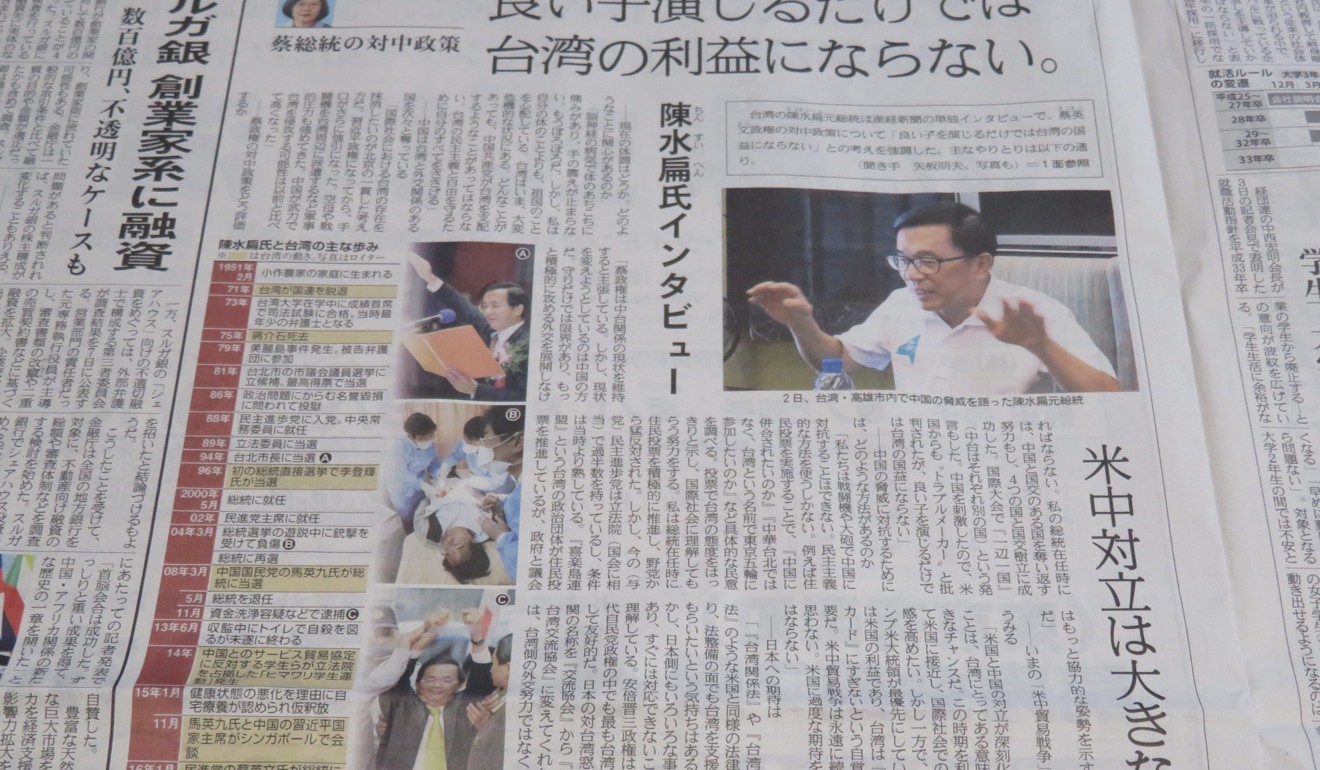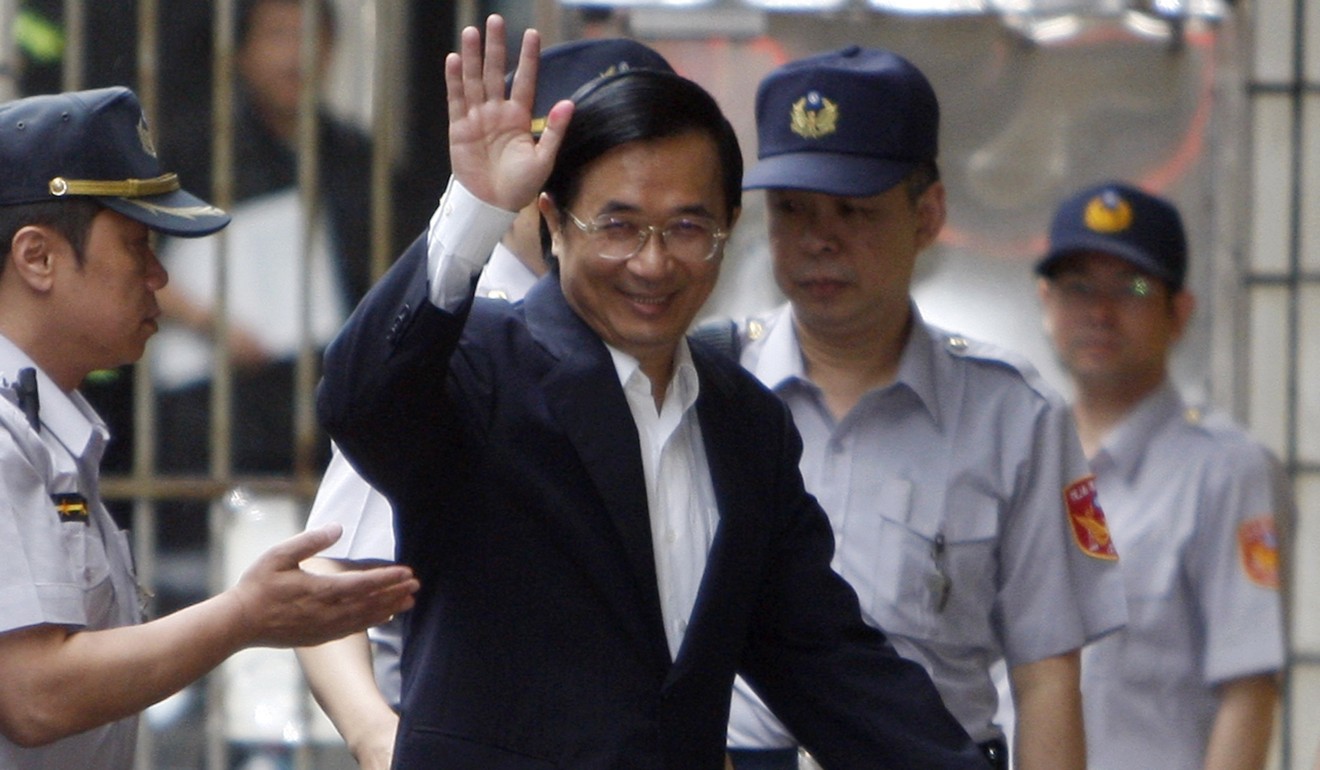
Taiwan’s former president Chen Shui-bian calls for island to vote on whether it wants to be part of China
Disgraced former leader’s comments were reported in Japanese newspaper but could have violated parole conditions
Taiwan’s disgraced former president Chen Shui-bian has called for a referendum on whether the self-ruled island wants to be a part of China.
Chen, whose comments were reported in a Japanese newspaper, also said that present leader Tsai Ing-wen, should not expect too much from US President Donald Trump, who is treating the island as a pawn.
Chen was taking part in what was described as a “talk” with Taiwanese residents of Japan in the presence of a reporter from Sankei newspaper.
However, the remarks – made in the Taiwanese city of Kaohsiung – may have been a violation of the parole conditions under which he was released early from a 19-year jail sentence for corruption on medical grounds.
Chen said that Tsai, of the independence-leaning Democratic Progressive Party, should push for such a referendum to let the world know that “Taiwanese people do not want to be a part of China”.

Emphasising that Taipei faced serious challenges from Beijing, which has stepped up its military and diplomatic pressure on the island, he said it was time for Tsai’s government to take action rather than maintaining the status quo.
“We do not have [strong] military forces, but what we can do is resort to democratic ways to counter [China],” he was quoted as saying.
Beijing considers Taiwan a wayward province that must eventually be reunified with the mainland, if necessary by force.
It has targeted the island in various ways, ranging from peeling away its remaining diplomatic allies to demanding private businesses like airlines and international organisations refer to Taiwan as part of China in an effort to make Tsai accept the one-China principle.
Beijing has stressed that the principle is the political foundation for the resumption of cross-strait exchanges and communications but Tsai has refused to accept it since taking office in 2016.
On US-Taiwan relations, Chen said the Trump administration appeared to be friendly to Taiwan, but in reality “Taiwan has long remained as a US card [to play] against China”, adding that Tsai should not “expect too much from the Trump administration”.
With Trump waging a trade war against China, relations between Taiwan and the US have warmed.
Taiwan ally Nauru snub to Beijing threatened to derail Pacific summit
The US president has signed the Taiwan Travel Act to allow high-level official exchanges while the National Defence Authorisation Act allows for more and larger weapons sales as well as military exchanges.
Chen also called on the Tsai government to treat Japan better, saying it has not done strong enough to reciprocate the goodwill from Japanese Prime Minister Shinzo Abe, whom he said had been more friendly towards Taiwan than any other Japanese leader.
Chen, a former member of Tsai’s DPP, sharply criticised his successor Ma Ying-jeou from the mainland-friendly Kuomintang, saying his policy of engagement with mainland China has served only to hurt Taiwan.

Chen, who was released after serving five years in 2015, also said his jail sentence for corruption was the result of a political witch hunt, but he was willing to be nailed on this “democratic cross” for the sake of Taiwan.
Chen’s comments are expected to prompt allegations that he has violated the terms of his medical parole, which bar him from speaking to news media and making public speeches to any political event.
Sankei said the comments had been made while Chen was meeting friends from Japan.
Lee Chin-kuo, the deputy warden of Taichung Prison, where Chen had been incarcerated, said the former leader had not actively sought an interview with the media, adding that the prison authority would not take any further action, the Central News Agency reported.
Should Taiwan be worried if it loses all its allies?
The Justice Ministry said is was up to the prison to decide whether Chen had broken the conditions of his parole.
But Lee Yen-hsiu, a Kuomintang member of parliament, cried foul, saying the Tsai government was turning a blind eye to Chen’s activities and no other prisoners on medical parole were allowed to behave in a similar fashion.
“He is on medical parole and is supposed to follow the regulations and stay quiet at home, but in the past few years, he has not only made a number of public appearances but has also stayed highly vocal on social media and other publications,” she said.

